Mark Rutte
Mark Rutte (Dutch pronunciation: [ˈmɑrk ˈrʏtə] (![]()
Mark Rutte | |
|---|---|
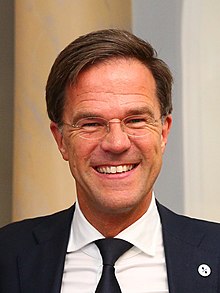 Rutte in 2017 | |
| Prime Minister of the Netherlands Minister of General Affairs | |
| Assumed office 14 October 2010 | |
| Monarch | Beatrix Willem-Alexander |
| Deputy | See list
|
| Preceded by | Jan Peter Balkenende |
| Leader of the People's Party for Freedom and Democracy | |
| Assumed office 31 May 2006 | |
| Preceded by | Jozias van Aartsen |
| State Secretary for Education, Culture and Science | |
| In office 17 June 2004 – 27 June 2006 | |
| Prime Minister | Jan Peter Balkenende |
| Preceded by | Annette Nijs |
| Succeeded by | Bruno Bruins |
| State Secretary for Social Affairs and Employment | |
| In office 22 July 2002 – 17 June 2004 | |
| Prime Minister | Jan Peter Balkenende |
| Preceded by | Hans Hoogervorst Annelies Verstand |
| Succeeded by | Henk van Hoof |
| Member of the House of Representatives | |
| In office 23 March 2017 – 26 October 2017 | |
| In office 20 September 2012 – 5 November 2012 | |
| In office 28 June 2006 – 14 October 2010 | |
| In office 30 January 2003 – 27 May 2003 | |
| Personal details | |
| Born | 14 February 1967 The Hague, Netherlands |
| Political party | People's Party for Freedom and Democracy |
| Residence | Catshuis (officially) |
| Education | Leiden University (BA, MA) |
| Signature | |
| Website | Government website |
After a career in business, Rutte was appointed State Secretary for Social Affairs and Employment in 2002 by Prime Minister Jan Peter Balkenende of the Christian Democratic Appeal (CDA), after a coalition agreement guaranteed the VVD several seats in the cabinet. Rutte was subsequently elected to the House of Representatives at the 2003 election. In 2004, he became State Secretary for Education, Culture and Science. After the 2006 Dutch municipal elections, which saw heavy losses for the VVD, the party's leader, Jozias van Aartsen, announced his resignation. Rutte stood the subsequent leadership election, and was elected on 31 May, resigning from the cabinet shortly afterwards. Rutte led his party into the 2006 election weeks later; although the VVD lost six seats, they became the largest party not in government.
At the 2010 general election, the VVD won the highest number of votes cast, resulting in them becoming the largest party in the House of Representatives for the first time in the party's history. After lengthy coalition negotiations, Rutte was sworn in as Prime Minister of the Netherlands leading the First Rutte cabinet. When Rutte was sworn in on 14 October 2010, he became the first liberal prime minister in 92 years, and the second-youngest in Dutch history.[1]
An impasse on talks on the budget led to his government's early collapse in April 2012, but the subsequent general election saw the VVD won its highest number of seats ever, leading to a coalition between the VVD and the Labour Party. The government became the first to see out its full term since 1998, and while at the 2017 general election the VVD lost seats, it remained the largest party. After a record-long formation period, Rutte agreed a new coalition between the VVD, CDA, D66 and CU parties, and was sworn in for a third term as Prime Minister on 26 October 2017.
Education and professional life
Rutte was born in The Hague, in the province of South Holland,[2] in a Dutch Reformed family. He is the youngest child of Izaäk Rutte (5 October 1909 – 22 April 1988), a merchant, and his second wife, Hermina Cornelia Dilling (13 November 1923 – 13 May 2020), a secretary. Izaäk Rutte worked for a trading company; first as an importer in the Dutch East Indies, later as a director in the Netherlands. His first wife was a sister of his second wife, Petronella Hermanna Dilling (17 March 1910 – 20 July 1945), who died while both were interned in Tjideng, a prisoner of war camp in Batavia, now Jakarta, on 20 July 1945, during World War II.[3][4]
Rutte attended the Maerlant Lyceum from 1979 until 1985[5], specialising in the arts. Although Rutte's original ambition was to attend a conservatory and become a concert pianist,[6] he went to study history at Leiden University instead, where he obtained a MA degree in 1992.[7] Rutte combined his studies with a position on the board of the Youth Organisation Freedom and Democracy, the youth organisation of the VVD, of which he was the chair from 1988 to 1991.[8]
After his studies, Rutte entered the business world, working as a manager for Unilever (and its food subsidiary Calvé). Until 1997, Rutte was part of the human resource department of Unilever, and played a leading role in several reorganisations. Between 1997 and 2000, Rutte was staff manager for Van den Bergh Nederland, a subsidiary of Unilever's. In 2000, Rutte became a member of the Corporate Human Resources Group, and in 2002, he became human resource manager for IgloMora Groep, another subsidiary of Unilever's.[9]
Between 1993 and 1997, Rutte was a member of the national board of the VVD. Rutte also served as a member of the VVD candidate committee for the general election of 2002. Rutte was elected as Member of Parliament in 2003.
Early political career
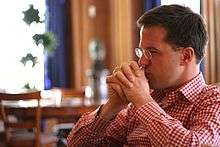
Rutte served as State secretary in the Social Affairs and Employment ministry from 22 July 2002 to 17 June 2004 in the First and Second Balkenende cabinets. Rutte was responsible for fields including bijstand (municipal welfare) and arbeidsomstandigheden (Occupational safety and health). After the 2003 elections Rutte was briefly also a member of the House of Representatives, from 30 January to 27 May 2003.
Rutte later served as State secretary for Higher Education and Science, within the Education, Culture and Science ministry, replacing Annette Nijs, from 17 June 2004 to 27 June 2006, in the Second Balkenende cabinet. In office, Rutte showed particular interest in making the Dutch higher education system more competitive internationally, by trying to make it more market oriented (improving the position of students as consumers in the market for education). Rutte would have been succeeded by former The Hague alderman Bruno Bruins. Before Bruins could be sworn into office, the second Balkenende cabinet fell. In the subsequently formed Third Balkenende cabinet Bruins succeeded Rutte as State secretary.
Rutte resigned from his position in government in June 2006 to return to the House of Representatives, and he soon became the parliamentary leader of the VVD. Rutte became an important figure within the VVD leadership. Rutte was campaign manager for the 2006 municipal elections.
Party leadership election
After the resignation of Jozias van Aartsen, the VVD having lost in the 2006 Dutch municipal election, the party held an internal election for lijsttrekker, in which Rutte competed against Rita Verdonk and Jelleke Veenendaal. On 31 May 2006, it was announced that Mark Rutte would be the next lijsttrekker of the VVD. He was elected by 51.5% of party members. Rutte's candidacy was backed by the VVD leadership, including the party board, and many prominent politicians such as Frank de Grave, former minister of Defence, Ivo Opstelten, the mayor of Rotterdam and Ed Nijpels, the Queen's Commissioner of Friesland. The Youth Organisation Freedom and Democracy, the VVD's youth wing, of which he had been chair, also backed him. During the elections he promised "to make the People's Party for Freedom and Democracy a party for everyone and not just of the elite". His youthful appearance has been likened to the successful former leader of the Labour Party, Wouter Bos.
Rutte said that the Christian Democratic Appeal (CDA) party was a group that "the People's Party for Freedom and Democracy could do business with".[10] He had also stated that with the social security ideas of the Labour Party, which he called too socialist, it was unlikely that the VVD would cooperate or form a coalition after the elections.
2006 general election
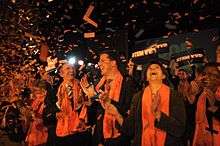
For the 2006 general election, the VVD campaign with Rutte as leader did not get off to a good start; he received criticism from within his own party.[11] Rutte was said to be overshadowed by his own party members Rita Verdonk and Gerrit Zalm, as well as being unable to penetrate between Wouter Bos and Jan Peter Balkenende, who were generally seen as the prime candidates to become the next Prime Minister. On 27 November, it became known that Rita Verdonk managed to obtain more votes than Mark Rutte; he obtained 553,200 votes against Verdonk's 620,555.[11][12] After repeated criticisms by Verdonk on VVD policy, Rutte expelled her from the party's parliamentary faction on 13 September 2007.[13]
2010 general election
In the 2010 general election, Rutte was once again the lijsttrekker for the VVD. It won 31 seats to become the largest party in the House of Representatives for the first time ever.[14] A long period of negotiations followed, with several personalities succeeding each other, being appointed by Queen Beatrix in order to find out what coalition could be formed. Efforts to form a coalition between the VVD, CDA and PvdA failed. Instead the only possibility appeared to be a center-right coalition of liberals and Christian Democrats (CDA), with the outside support of the Party for Freedom (PVV), led by Geert Wilders.
Prime Minister of the Netherlands
First term
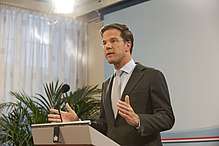
.jpg)
After securing support for a coalition between the VVD and CDA, Rutte was appointed as formateur on 8 October 2010; Rutte announced his prospective cabinet, including Maxime Verhagen from the CDA as Deputy Prime Minister. On 14 October, Queen Beatrix formally invited Rutte to form a government, and later that day, Rutte presented his first cabinet to Parliament. The government was confirmed in office by a majority of one, and Rutte was sworn in as Prime Minister of the Netherlands, becoming the first Liberal to serve in the role since Pieter Cort van der Linden in 1918.[14] He also became the second-youngest Prime Minister in Dutch history, after Ruud Lubbers.
After victory at the 2011 Dutch provincial elections, the VVD secured its status as the lead party within the government. In March 2012, seeking to comply with European Union requirements to reduce the nation's deficit, Rutte began talks with his coalition partners on a budget which would cut 16 billion euros of spending. However, PVV leader Geert Wilders withdrew his party's informal support from the government on 21 April, stating that the proposed budget would hurt economic growth.[15] This led to the early collapse of the government, and Rutte submitted his resignation to Queen Beatrix on the afternoon of 23 April.[16] His government had lasted for 558 days, making it one of the shortest Dutch cabinets since World War II.[15]
Second term
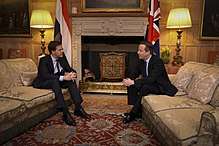
.jpg)
Ahead of the 2012 general election, Rutte was named the VVD's lijsttrekker for the third time. At the election in September, the VVD won an additional 10 seats, remaining the largest party in the House of Representatives; the CDA and PVV saw their number of seats fall significantly.[17] The VVD quickly negotiated a coalition agreement with the Labour Party, and on 5 November 2012, the Second Rutte cabinet was confirmed by a vote in Parliament, seeing Rutte returned as Prime Minister of a VVD-PvdA coalition government.
In 2014, The Hague held a Group of Seven special meeting after the Malaysia Airlines Flight 17 was shot down in Ukraine with 193 Dutch nationals aboard. During the municipal elections of 2014, the VVD finished third behind local parties and the CDA; at the European Parliament election the same year, it finished fourth. At the 2015 Dutch provincial elections, however, the VVD remained the largest party in the province's legislatures with about 15% of the vote, but lost 23 seats in the States-Provincial.
In April 2016, Rutte was appointed by United Nations Secretary-General Ban Ki-moon and President of the World Bank Group Jim Yong Kim to the High-Level Panel on Water. Co-chaired by Mauritius President Ameenah Gurib and Mexican President Enrique Peña Nieto, the joint United Nations-World Bank Group panel was set up to accelerate the implementation of Sustainable Development Goal 6 (SDG 6).[18] That month also saw the 2016 Dutch Ukraine–European Union Association Agreement referendum. In November 2016 the House of Representatives approved by 132 votes against 18 a ban on the Islamic burqa in some public spaces including schools and hospitals, a bill supported by the VVD.[19]
.jpeg)
Rutte's second cabinet completed its full four-year term without collapsing or losing a vote of no confidence, becoming the first cabinet to do so since the First Kok cabinet from 1994 to 1998.[20]
Third term
.jpg)
The VVD went into the 2017 general election with a small lead over the PVV in most opinion polls. Rutte was judged to have managed the 2017 Dutch–Turkish diplomatic incident well according to similar polling. While the VVD lost 8 seats in the general election, the PvdA lost 29, and these seats were split between a number of other parties, leaving the VVD the largest party in parliament for the third successive election. After holding coalition discussions, Rutte negotiated a grand coalition with the CDA, D66 and CU; he presented his third cabinet on 26 October 2017, and was sworn in as Prime Minister for a third term. The 225 days between the general election and the installation of the government was the longest such period in Dutch history.
The coalition agreement's plan to abolish the 15% dividend tax (providing the state €1.4 billion per year) proved highly unpopular, as it had not been mentioned in any party's program, and it later appeared that major Dutch companies like Shell and Unilever had secretly been lobbying for that measure.[21]
In July 2018, Rutte became a topic in the international news because of what was considered a "typical Dutch bluntness", by interrupting and explicitly contradicting the American president Donald Trump during a meeting with the press at the Oval Office in the White House.[22][23]
Rutte's third government provided materials to the Levant Front rebel group in Syria.[24] In September 2018, the Dutch public prosecution department declared the Levant Front to be a "criminal organisation of terrorist intent", describing it as a "salafist and jihadistic" group that "strives for the setting up of the caliphate".[25]
On 21 March 2018 the Dutch Intelligence and Security Services Act referendum was held. It resulted in a rejection. At the 2019 provincial elections, Rutte's VVD suffered a blow following the victory of right-wing populist newcomer Forum for Democracy (FvD).
During the negotiations for the COVID-19 recovery fund in the European Union, Rutte is considered the unofficial leader of the Frugal Four,[26] demanding loans instead of grants and more conditions on them.
Honours
.svg.png)
.svg.png)
Personal life
Rutte is single.[2][28] He is a member of the Dutch Protestant Church.[29] Rutte still teaches social studies for two hours a week at a secondary school, the Johan de Witt College in The Hague.[7][30] Rutte is known to be a big fan of the writing of Robert Caro, especially his book about Robert Moses, The Power Broker.[31]
References
- "Mark Rutte: eerste liberale premier sinds 1918" (in Dutch). eenvandaag.nl. 7 October 2010. Archived from the original on 26 May 2012. Retrieved 23 April 2012.
- (in Dutch) Drs. M. (Mark) Rutte, Parlement & Politiek. Retrieved 2 August 2014.
- Death of Mark Rutte's mother
- Pedigree
- "Rutte opent Maerlant-Lyceum Den Haag". Hart van Nederland. 16 February 2011. Retrieved 10 June 2020.
- "Rutte had pianoleraar kunnen zijn". De Pers. Archived from the original on 11 March 2012. Retrieved 23 April 2012.
- "CV | Mark Rutte". rijksoverheid.nl. Archived from the original on 20 March 2012. Retrieved 23 April 2012.
- "Mark Rutte" (in Dutch). VVD.
- "Biografie – Mark Rutte". elsevier.nl. Archived from the original on 24 May 2012. Retrieved 23 April 2012.
- "CDA calls for longer working week". dutchnews.nl. 18 August 2006.
- (in Dutch) "Onvrede binnen VVD over Rutte," Algemeen Dagblad (31 October 2006). Retrieved 14 May 2014.
- "Tension mounts as VVD waits for Verdonk's reaction to voters' support". dutchnews.nl. 28 November 2006.
- (in Dutch) Oranje, Joost and Guus Valk, "Kamp: VVD moet Rutte nu steunen," Archived 15 May 2014 at the Wayback Machine NRC Handelsblad (15 September 2007). Retrieved 14 May 2014. Literal English translation: "Verdonk was yesterday by Mark Rutte formally expelled from the VVD's parliamentary party in the House of Representatives after she had again voiced criticism of the party in the press." Dutch original: "Verdonk werd gisteren formeel door Mark Rutte uit de Tweede Kamerfractie van de VVD gezet, nadat zij in de pers opnieuw kritiek had geuit op de fractie."
- "Election 2010 – The Netherlands shifts to the right". NRC Handelsblad. 10 June 2010. Archived from the original on 13 June 2010. Retrieved 10 June 2010.
- "Dutch government falls in budget crisis". BBC News. 23 April 2012. Retrieved 24 April 2012.
- Gilbert Kreijger and Thomas Escritt (23 April 2012). "Dutch Prime Minister resigns in budget cuts row". Reuters. Retrieved 24 April 2012.
- "Volg de verkiezingen 2014 live". De Volkskrant. Archived from the original on 15 September 2012.
- United Nations Secretary-General, World Bank Group President Appoint High-Level Panel on Water United Nations, press release of 21 April 2016.
- The Netherlands votes for partial restrictions of the burqa in public space, independent.co.uk, 29 November 2016.
- "Kabinet-Rutte II verslaat Lubbers III: langstzittende kabinet". NOS (in Dutch). Retrieved 17 October 2017.
- Rutte: effect afschaffen dividendbelasting op bedridden niet bekend Archived 1 December 2017 at the Wayback Machine (in Dutch), rtlnieuws.nl.
- Trump got a dose of Dutch bluntness from visiting prime minister
- Rutte interrupts Trump! 4 Things that happened at the Rutte – Trump meeting
- "Dutch govt under fire for Syria opposition support". MSN. 11 September 2018. Archived from the original on 1 February 2019. Retrieved 8 February 2019.
- "Dutch funded 'jihadist' group in Syria, terror trial may now falter". Dutch News. 11 September 2018. Retrieved 16 September 2018.
- Dodman, Benjamin (20 July 2020). "Dutch PM Mark Rutte, the thrifty europhile holding Europe hostage". France 24. Reuters, AFP. Retrieved 21 July 2020.
- 2019-S8 – Honorary Companion (AC) in General Division (9 October 2019)
- "Ten things you didn't know about prime minister Mark Rutte". Dutch News. 3 November 2015. Retrieved 14 March 2017.
- "Rutte: Het geloof blijft een worsteling voor mij". RD.nl (in Dutch). Retrieved 30 October 2019.
- "Mark Rutte als leraar: 'Hij is grappig, beetje streng en neemt nooit zijn telefoon op'". RTL Nieuws (in Dutch). 8 October 2016. Retrieved 10 June 2020.
- "The Dutch Prime Minister Is a Big Fan of Robert Caro". New York Times. 13 May 2016. Retrieved 31 March 2017.
External links
| Wikimedia Commons has media related to Mark Rutte. |
- Mark Rutte, official government profile
- Appearances on C-SPAN
| Political offices | ||
|---|---|---|
| Preceded by Hans Hoogervorst |
State Secretary for Social Affairs and Employment 2002–2004 |
Succeeded by Henk van Hoof |
| Preceded by Annette Nijs |
State Secretary for Higher Education and Science 2004–2006 |
Succeeded by Bruno Bruins |
| Preceded by Jan Peter Balkenende |
Prime Minister of the Netherlands 2010–present |
Incumbent |
| Party political offices | ||
| Preceded by Jozias van Aartsen |
Leader of the People's Party for Freedom and Democracy 2006–present |
Incumbent |

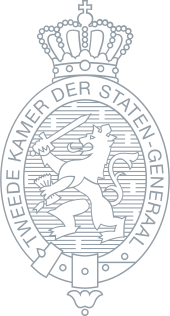
_Logo.svg.png)